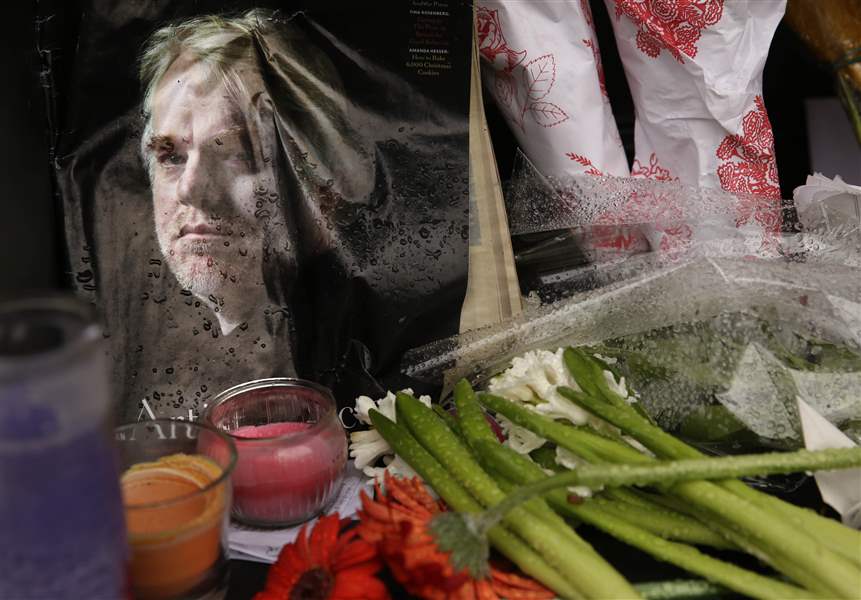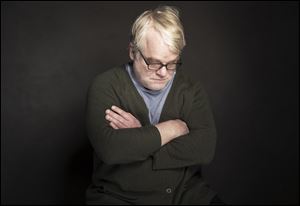
APPRECIATION
Hoffman was acting at its best
2/3/2014
A makeshift memorial outside the building where the body of actor Philip Seymour Hoffman was found in New York.
ASSOCIATED PRESS

Hoffman
Philip Seymour Hoffman wasn’t a movie star in the conventional sense of the term. He wasn’t glamorous or given to the kind of serial-dating, motorcycle-riding, scene-making “lifestyle” that encourages fans to think they know all about you. Rather than a manufactured persona, filmgoers who mourn the 46-year-old actor’s death Sunday are remembering moments in which Hoffman created textbook examples of acting at its very best.
For most people, those moments occurred in movies by Paul Thomas Anderson, the filmmaker who brought Hoffman to national prominence in his 1997 disco-porno masterpiece, Boogie Nights, but who had cast the actor earlier in Anderson’s feature debut, Hard Eight. In 2006, Hoffman won an Oscar for his lead performance in Capote, an alert, gratifyingly un-schticky reanimation of the author of In Cold Blood.
But for so many bravura star turns there are countless, equally electrifying, examples in smaller movies, from his beleaguered son of an abusive father in The Savages to his obsessive theater director in Charlie Kaufman’s gnarly art-imitates-life-imitates-art head-trip, Synecdoche, New York.
That Hoffman died amid talk of a drug overdose will no doubt invite the inevitable talk of an artist and his demons. But filmgoers are reminded first of that artistry.
Hoffman was no one’s idea of a matinee idol. He was, instead, a character actor, that yeoman laborer of filmdom who, without a pre-packaged image to protect, can be relied on to sacrifice vanity and shun mass adoration in the service of total immersion into a role. In Hoffman’s case, that meant paunchy, rheumy-eyed regular guys and vulnerable losers whose desperate search for connection so often mirrored his audience’s own shabby, shameful, unphotogenic lives.
In the 2010 film Jack Goes Boating, which marked Hoffman’s directorial debut, he personified a sad-sack, anonymous striver not as a caricature but as a man of quiet courage and tenderness. The next year, he proved just as adroit playing a tough, politics-ain’t-beanbag political adviser in George Clooney’s Washington thriller, The Ides of March — which was released within weeks of Moneyball, in which Hoffman not only brought rumpled deadpan humor to Oakland A’s manager Art Howe but also helped make Brad Pitt more credible in a similar role.
And 2012 saw similar, seemingly effortless spins-on-a-dime: No sooner had Hoffman delivered a galvanizing, blow-the-doors-off turn as self-deluded cult leader Lancaster Dodd in Anderson’s The Master than he appeared, altogether credibly, as a violinist in the soft-spoken chamber-music melodrama A Late Quartet. So went the pattern of Hoffman’s singular career, all the more exceptional for being so un-showy. Rarely has an actor so consistently elevated the material he worked with, regardless of genre, budget, aesthetic merit, or box-office throw-weight.
There will be talk that this is the latest in a depressingly long line of actors who have succumbed to substance abuse. That people blessed with such prodigious gifts can also be so tortured, we assume, has something to do with the price of genius. They’re simply too sensitive, too deep-feeling, for this cold, hard world.
It’s a romantic thought, and one that allows admirers of great artists to speak of their loss with compassion and respect. But rhetoric of artistic demons obscures what is, in reality, simply a crippling, fatal disease — of which Hoffman is the latest famous casualty and which affects millions of people far outside Manhattan and Hollywood.
Whatever language we use doesn’t obscure the fact that a superbly talented actor has been silenced forever.